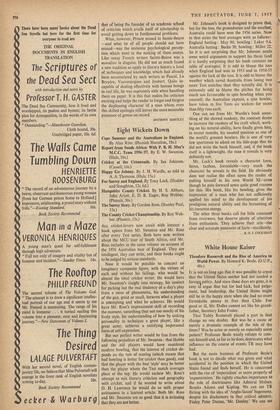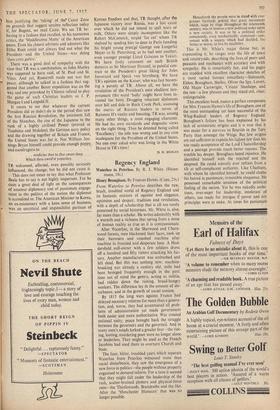White House Kaiser
IT is not so long ago that it was possible to argue that the United States neither had nor needed a foreigrk policy. And since those days are gone, it is easy tor argue that but for bad luck, bad judge- ment, bad leadership, the United States might still be in the happy state when she had no more formidable enemy to fear than Chile. For good or ill, Mr. Dulles cannot act like his grand- father, Secretary John Foster.
That Teddy Roosevelt played a part in that change no one doubts. But was he a cause or merely a dramatic example of the tide of the times? Was he actor or merely an especially noisy patient? Professor Beale wisely refuses to com- mit himself and, as far as he does, deprecates what influence on the course of events TR may have had.
But the main business of Professor Beale's book is not to decide what was given and what accidental in the position in which the United States found and finds herself. He is concerned with the rise of 'imperialism' or more properly of `expansionism.' He rightly attaches importance to the role of doctrinaires like Admiral Mahan, Brooks Adams and Kipling. We can see TR flirting with the idea of 'Anglo-Saxon' hegemony, despite his disclaimers to that critical admirer, Finley Peter Dunne, 'Mr. Dooley.' We can see him justifying the 'taking' of the Canal Zone on grounds that suggest sombre reflection today if, for Bogota, we read Cairo. We see TR be- having in a fashion that recalled, to his numerous critics, the 'Meddlesome Matty' of the American poem. Even his closest advisers and admirers like Elihu Root could not always find out what the President--and the United States—was doing 'dans cette galore.'
There was a good deal of sympathy with the view that TR was a combination, as John Morley was supposed to have said, of St. Paul and St. Vitus. And yet, Roosevelt made not war but peace, although he talked in a fashion that sug- gested that another Boxer expedition was on the way and one provoked by Chinese refusal to play the game of such Christian leaders as J. P. Morgan I and Leopold II.
It seems to me that whatever the current President did or didn't do in the period that saw the first Russian Revolution, the imminent fall of the Manchus, the rise of the Japanese to the rank of a highly civilised' Power (proved at Tsushima and M ukden), the German navy policy and the drawing together of Britain and France, the United States was for it. Not William Jen- nings Bryan himself could provide enough poppy and mandragora to
. . . medicine thee to that sweet sleep
Which thou owed'st yesterday.
TR welcomed, affected, even possibly seriously influenced, the change, but he did not cause it.
This does not mean to say that what Professor Beale has to say is not highly important. For he casts a great deal of light on the consequences of amateur diplomacy and of passionate engage- ment in the politics of the nation the diplomat is accredited. to. The American Minister to Korea, an ex-missionary with a keen sense of business, a was an uncritical and impossibilist partisan of Korean freedom and that, TR thought, after the Japanese victory over Russia, was a lost cause over which he did not intend to spill tears or milk. Others were simply incompetent like the Robert McCormick, torpid 'fat cat' whom TR shelved by sending him to doze in Paris (sending his bright young prot46 George von Lengerke. Meyer to St. Petersburg, as he had sent another, even younger protégé Lloyd Griscom to Tokio). We have lively comment on such British dormice as Sir Mortimer Durand, in painful con- trast to the President's great liking for Jules Jusserand and Speck von Sternburg. We have TR's opinion on the Kaiser, who was fast becom- ing a parody of TR. Above all, we have the revelation of the President's own ebullient tem- perament (the word 'bully' might have been in- vented for him). Dragging reluctant diplomats over hill and dale in Rock Creek Park, assessing the merits of Russian leaders in terms of Rameses II's vanity and boasting, TR was, among many other things, a most engaging character. He had his own standards and dogmatic views on the right thing. Thus he detested being called `Excellency'; the title was wrong and in any case inadequate for the President of the United States. No one ever asked who was living in the White House in TR's time
D. W. BROGAN



































 Previous page
Previous page